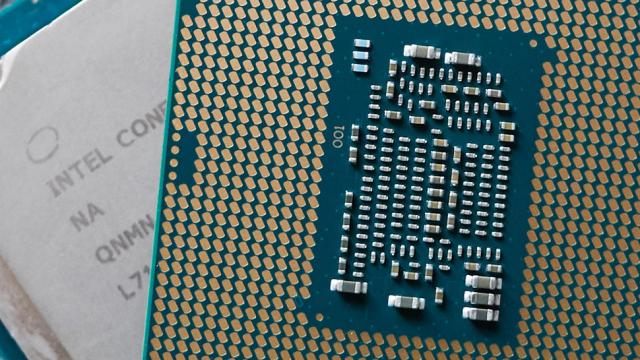It’s been almost a year since Intel first launched its 8th generation of computer processors, and now, finally, it seems to be completing the lineup with a series of CPUs intended for super thin laptops and 2-in-1s. The catch—the biggest improvements aren’t with processor speed, but with the wifi.
In the material released by Intel for its new U- and Y-series CPUs it spends precious little time talking about how much faster the CPUs handle day to day tasks, and a whole lot of time talking up the addition of built-in Gigabit wifi. On CPUs intended for larger products—like cheap laptops or desktops—this would be a silly brag. Those devices can afford to have a third party module handling the wifi. But these new U- and Y-series chips are intended for super thin devices in which space is at a premium. Built-in Gigabit wifi (also known as 802.11ac) makes these chips mighty appealing to laptop makers who can shave more millimetres off their devices.
So what would this actually mean for you and I—consumers at the mercy of chip and device makers? It should mean thinner laptops and 2-in-1s with better battery life. If the battery is only having to power the one chip, and not manage power for a separate wifi module than it can run more efficiently—plus device makers can use the saved room to squeeze in larger batteries.
In fact, Intel claims its new U-series processors can last an estimated 16 hours when the brightness of a unit’s display is set to 200nits and a 1080p video is played back. That’s impressive for an Intel CPU, which tends to be more power hungry than something like the Qualcomm Snapdragon CPUs a few Windows laptop makers have been using this year.
But beyond improved wifi speeds (which is admittedly never a bad thing) and battery life, these new chips don’t sound like they’re that much faster than the current generation. In the materials, Intel has released about the new chips every speed claim was in comparison to a 5-year-old system. So while the claim that these chips are two times faster than a five-year-old system is impressive, it gives us little understanding of their speed compared to 7th-gen CPUs. When pressed for details Intel told Gizmodo that speed improvements for these 8th-gen chips versus 7th-gen were in the “double digits”. That’s a pretty wide spread of potential speed improvements! They could be 99-per cent faster or simply 10-per cent faster.
Previous 8th-gen chips claimed to be 10 to 20 per cent faster than the 7th generation, so it is safe to assume these chips also have that moderate improvement to speed.
Six chips total were announced today. The U-series CPUs are based on the Whiskey Lake architecture—itself an adaptation of the Kaby Lake architecture found in the 7th generation of Intel processors. There will be an i7-8565U with a max clock of 4.6GHz, an i5-8265U with a max clock of 3.9GHz, and an i3-8165U with a max clock of 3.9GHz. All three chips have a TDP of 15W. 15W CPUs are usually found in your thinnest laptops, where speed is sacrificed for form. They’re also like a mild step up from the current 8th-gen U-series CPUs announced last August. Those were based on the Kaby Lake R architecture and are found in devices like the Dell XPS 13 and Razer Blade Stealth.
Be sure, by the way, to take note of what the CPU laptop makers claim is inside. With the U-series now made up of a mix of older Kaby Lake R (which does not have the wifi speed improvement) and Whiskey Lake (which does) you’ll want to double check. A quick shorthand is to look at the last number before the U. Older Kaby Lake R CPUs end in a zero, while newer Whiskey Lake CPUs end in a five.
But for devices in which thin is really in device makers will likely opt for the new Y-series based on the Amber Lake architecture. Again this architecture is an adaption for Kaby Lake. These chips are all 5W CPUs intended for super thin 2-in-1s (think the cheapest Surface Pro) and laptops (think Apple MacBook). As with the U-series, there are three chips. An i7-8500Y with a max clock of 4.2GHz, an i5-8200Y with a max clock of 3.9GHz, and an m3-8100Y with a max clock of 3.4GHz.
IFA is currently kicking off in Berlin, and e multiple laptop makers will likely announce devices with these chips inside. If you’re eager for the new 8th-generation you can expect to start seeing them in devices on store shelves by the end of the year.
